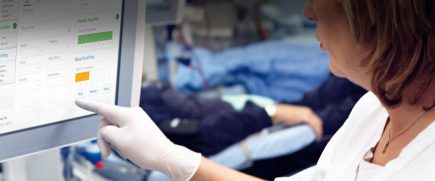Hari Nallan, Cofounder and CEO, Think Design Collaborative Pvt Ltd in an interaction with Ekta Srivastava, HealthTechnology magazine. This interview appeared in Health Technology magazine, in May 2016.
Hari Nallan - May 2016

In your opinion, what role do emerging technologies like Big data play in the current technology adoption for healthcare vertical?
With our experience in Healthcare vertical, working with leaders like Medtronic, Sun Pharma, Dr. Reddy’s Labs, and few disruptive startups, we can affirmatively say that Big data plays a significant role already; it is going to exponentially increase in the coming years.
In one of the assignments we worked on, the proposition was to predict short term and long term drug demand using Big Data. By using this intelligence, Pharma companies can plan production cycles in advance, thus helping the users with ready availability of products as and when needed. The application would provide fairly accurate predictions segmenting to the details of geography, city, pin code to the extent of Pharmacy, which is the final mile in delivery.
In another application we designed recently, the proposition was to understand health-related trends in the entire country. The solution, which was proposed to be used by state departments in fairly small countries (population less than 20 million) saw immediate adoption by its target customers. The application integrates the data available through National Health Cards and correlates it with drug usage patterns; at a larger level use certain algorithms to predict health trends in the country. Usage of such an application by State departments provides important insights to those departments and more importantly, help plan for measures in advance.
The public sector is still lagging in terms of technology adoption in India, more so for an essential sector like healthcare and Pharma. What do you think should be done to encourage the use of technology in providing better services to low-cost healthcare needs?
One of the main impediments to get meaningful data is the lack of proper record keeping. Any amount of digital technology investment will be futile if records are not kept/ logged. Healthcare is still predominantly unorganized in India and it is still very easy to purchase drugs without prescription… this means that most of the data is not even logged anywhere.
Since these practices are already mature in first-world economies, we could first start by emulating what has been implemented elsewhere and seen success.
Except for a few modern hospitals that have IT systems in place, India is yet to see the usage of technology, even at a very fundamental level.
In order to achieve significant progress in the next 3-5 years, it will be important to mandate certain practices. Since the Indian government has already successfully rolled out the UID scheme, it will not be difficult to link the patient’s data to their aadhaar number. This would be the starting point.
While Big data is at the forefront of enterprise, do you think that healthcare and Pharma can also benefit from it? What is public policy doing to leverage this technology?
Big Data is definitely at the forefront of enterprise; in the last few months, it has pervaded every field that is IT-enabled. We have seen and designed for big data in industries such as Telecom, Travel, Retail, Logistics and more. Healthcare and Pharma can definitely benefit from it.
We would say that the successful roll-out of UID/ Adhaar Card is the first baby step in leveraging this technology. With the right initiatives and mandates from the Government, it will be possible to leverage this technology in Healthcare and Pharma domains in the immediate future. We are certain that if this step is taken, we will see significant progress in the next coming years.
How can a PPP be a better alternative to fully owned government healthcare schemes? Do you see the PPP initiatives as more efficient at delivery of services?
PPP has proved to be a very successful model in the domain of infrastructure; and if there was no PPP, we would be living in a different kind of country now. We do think that PPP initiatives are the way forward to implement healthcare schemes; especially when it comes to execution and delivery (private sector has proved to be far more efficient than the government in execution and delivery). In Healthcare, there will always be some amount of sensitivity related to critical data and that is where the Government could intervene with some policies and regulations.
Telemedicine and wearable devices are the way forward, globally. How do you think India fares there, and what do you think should be done to meet global standards of adaptation?
We have done some work here too. In our experience, telemedicine is being quite effectively practiced in India already. However, the solutions still are make-do (jugaad) and lack refinement. User Experience Design can play a very big role here in making the entire system work, make the proposition merchandisable and credible.
Coming to wearables, India still has a long way to go in adoption. Apart from a fraction of our society who fancy wearables and use them, there is no serious amount of usage or adoption to say that it has arrived. However, we can confidently say that wearables will be the way to go in the near future. The reason for our hunch is that Indians have always readily accepted stand-alone solutions that solve specific problems. Priced and marketed well, we would say that wearables can be the next big thing in Healthcare technology in India.



